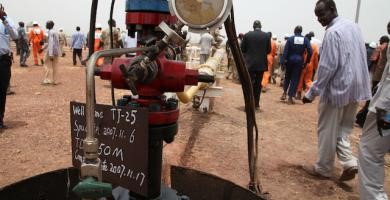 The South Sudanese Energy Ministry's Oct. 29 announcement that it will auction off a number of oil concessions by the end of 2013 illustrates the country's need to attract foreign oil companies in order to increase oil production and investments. South Sudan's economic dependence on its energy resources, as well as its ability to move oil exports through Sudan's pipelines, has set the stage for Juba to try to initiate development of its largest oil block. However, uncertainties about the size of the block's reserves, infrastructure limitations and the time required to develop these concessions could make this auction little more than a short-term influx of foreign funds.
The South Sudanese Energy Ministry's Oct. 29 announcement that it will auction off a number of oil concessions by the end of 2013 illustrates the country's need to attract foreign oil companies in order to increase oil production and investments. South Sudan's economic dependence on its energy resources, as well as its ability to move oil exports through Sudan's pipelines, has set the stage for Juba to try to initiate development of its largest oil block. However, uncertainties about the size of the block's reserves, infrastructure limitations and the time required to develop these concessions could make this auction little more than a short-term influx of foreign funds.
South Sudan currently produces around 190,000 barrels of oil per day, but a major part of its potential oil wealth remains untapped. The area known as "Block B" was awarded to French oil major Total SA in 1980, but the civil war between Khartoum and Juba in 1983, followed by persistent security concerns in South Sudan's Jonglei state, has prevented the company from moving beyond initial exploration. Block B, in which Total, U.S. energy major ExxonMobil and Kuwait's Kufpec currently hold rights, could boost South Sudan's oil revenues while leading to a longer period of oil production in the country if all or part of the block is included in the upcoming auction and if the auction attracts serious investment.
Juba has repeatedly attempted to push for continued exploration and eventual production in the oil block but has not yet made any progress. In 2012, Juba formulated a plan to break Block B into three separate concessions split among the shareholders of the concession. A plan considered earlier this year involved the current shareholders keeping two of the three separate concessions and opening the third up to new investors, but this failed to materialize despite Juba's negotiations with Total.
While Total and the other firms want to hold on to their concession in South Sudan, they have been trying to do so without restarting their activities. Apart from persistent security risks, the limitations of South Sudan's oil export infrastructure likely add to the companies' reluctance to start developing the concession.
No pipelines connect Block B to the pipeline running through Sudan to Port Sudan for export. Moreover, even if an approximately 300-kilometer (186-mile) pipeline connecting the concession to the lines running to Port Sudan were constructed, the capacity of the Greater Nile Oil Pipeline connecting South Sudan to Port Sudan would remain a limitation. The Greater Nile line has a capacity of about 500,000 barrels per day -- sufficient for the volumes of oil produced in South Sudan (which produced 350,000 barrels per day before the production shutdown in January 2012) and Sudan, which now produces about 150,000 barrels per day. However, there is no spare capacity to allow the export of Block B's potential production. The ongoing frictions between Khartoum and Juba also cast some doubt on the reliability of Sudan's pipelines as an export route.
These infrastructure problems connect the development of Block B with the construction of new export infrastructure. South Sudan and other countries in the region have proposed plans for pipelines to Djibouti through Ethiopia or to the port of Lamu through Kenya, but the necessary funding to complete either project has not yet been secured and the pipelines would face substantial security and geopolitical challenges. Juba's alternative efforts to bypass Sudan in exporting crude oil, including exporting supplies by truck, have not been feasible. However, attempts to exploit parts of the Block B concession could raise interest in developing alternative export routes, especially because added reserves from this concession would increase the time period over which potential investors could see a return on their investments.
Right now, the number or size of concessions in Block B to be auctioned is unclear. They could include smaller concessions in areas that have not been developed yet. Whatever shape the concessions take, production is not likely to begin soon. However, auctioning concessions in Block B will lead to an influx of foreign funds that could help Juba face its economic challenges in the short term. Moreover, the current government is divided and has been accused of achieving little to improve economic development in the country. Ahead of a 2014 election that Juba has tried (unsuccessfully) to delay, fresh foreign investment could help the administration portray itself as delivering improvements in governance.
Courtesy : Stratfor (www.stratfor.com)